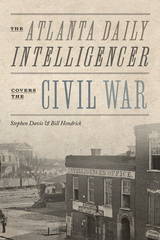
Confederate newspapers were beset by troubles: paper shortages, high ink prices, printers striking for higher pay, faulty telegraphic news service, and subscription prices insufficient to support their operations. But they also had the potential to be politically powerful, and their reporting of information—accurate or biased—shaped perceptions of the Civil War and its trajectory.
The Atlanta Daily Intelligencer Covers the Civil War investigates how Atlanta’s most important newspaper reported the Civil War in its news articles, editorial columns, and related items in its issues from April 1861 to April 1865. The authors show how The Intelligencer narrated the war’s important events based on the news it received, at what points the paper (and the Confederate press, generally) got the facts right or wrong based on the authors’ original research on the literature, and how the paper’s editorial columns reflected on those events from an unabashedly pro-Confederate point of view.
While their book focuses on The Intelligencer, Stephen Davis and Bill Hendrick also contribute to the scholarship on Confederate newspapers, emphasizing the papers’ role as voices of Confederate patriotism, Southern nationalism, and contributors to wartime public morale. Their well-documented, detailed study adds to our understanding of the relationship between public opinion and misleading propaganda
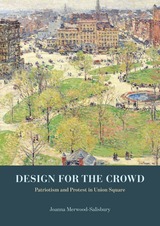
In this sweeping history of an iconic urban square, Merwood-Salisbury gives us a review of American political activism, philosophies of urban design, and the many ways in which a seemingly stable landmark can change through public engagement and design.
Published with the support of Furthermore: a program of the J. M. Kaplan Fund.
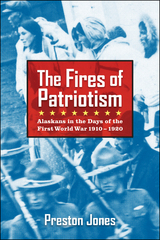
The Fires of Patriotism explores Alaska’s wartime experience, bringing to light new stories and new characters from a decade that shook the world. This multifaceted book explores the era through engaging stories and rare photos, offering a fresh perspective on World War I from a marginal land that forged its place in the greater unity of the country.
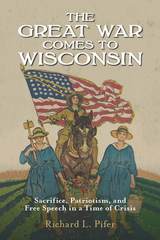
Instead of a comprehensive history of the battlefield, this book captures the homefront experience: the political debates over war policy, the worry over loved ones fighting overseas, the countless everyday sacrifices, and the impact of a wartime hysteria that drove dissent underground. It also includes the voices of soldiers from Wisconsin’s famed 32nd Division, through extensively quoted letters and newspaper accounts. Immerse yourself in the Wisconsin experience during World War I—a conflict that demonstrated America’s great capacity for sacrifice and generosity, but also for prejudice, intolerance, and injustice.


"Patriotism is the last refuge of scoundrels" -SAMUEL JOHNSON, 1775
Updated and revised following the 2004 elections, The Last Refuge describes the current state of American politics against the backdrop of mounting ecological and social problems, the corrosive influence of money, the corruption of language, and the misuse of terrorism as a political issue.
Setting out an agenda that transcends conventional ideological labels, David Orr contends that partisan wrangling is only a symptom of a deeper dysfunction: The whole political machinery that connects Americans' fundamentally honorable ideals with public policy is broken. The book offers a withering critique of the failings of the Bush administration, supplemented by new essays that look at the national-level dominance of the Republican Party and examine the fallacy that the evangelical right represents a Christian majority.
After analyzing the challenges of reforming the current system, Orr offers an empowering vision of a second American Revolution that peaceably achieves sustainability and charts a hopeful course for forward-looking citizens.

Intellectuals such as William James, John Dewey, Jane Addams, Eugene V. Debs, and W. E. B. Du Bois repudiated liberalism's association with acquisitive individualism and laissez-faire economics, advocating a model of liberal citizenship whose virtues and commitments amount to what Hansen calls cosmopolitan patriotism. Rooted not in war but in dedication to social equity, cosmopolitan patriotism favored the fight against sexism, racism, and political corruption in the United States over battles against foreign foes. Its adherents held the domestic and foreign policy of the United States to its own democratic ideals and maintained that promoting democracy universally constituted the ultimate form of self-defense. Perhaps most important, the cosmopolitan patriots regarded critical engagement with one's country as the essence of patriotism, thereby justifying scrutiny of American militarism in wartime.
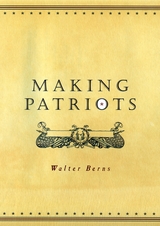
Walter Berns's Making Patriots is a pithy and provocative essay on precisely this paradox. How is patriotism inculcated in a system that, some argue, is founded on self-interest? Expertly and intelligibly guiding the reader through the history and philosophy of patriotism in a republic, from the ancient Greeks through contemporary life, Berns considers the unique nature of patriotism in the United States and its precarious state. And he argues that while both public education and the influence of religion once helped to foster a public-minded citizenry, the very idea of patriotism is currently under attack.
Berns finds the best answers to his questions in the thought and words of Abraham Lincoln, who understood perhaps better than anyone what the principles of democracy meant and what price adhering to them may exact. The graves at Arlington and Gettysburg and Omaha Beach in Normandy bear witness to the fact that self-interested individuals can become patriots, and Making Patriots is a compelling exploration of how this was done and how it might be again.
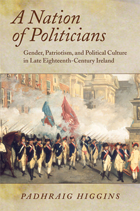
In A Nation of Politicians, Padhraig Higgins argues that the development of Volunteer-initiated activities—associating, petitioning, subscribing, shopping, and attending celebrations—expanded the scope of political participation. Using a wide range of literary, archival, and visual sources, Higgins examines how ubiquitous forms of communication—sermons, songs and ballads, handbills, toasts, graffiti, theater, rumors, and gossip—encouraged ordinary Irish citizens to engage in the politics of a more inclusive society and consider the broader questions of civil liberties and the British Empire. A Nation of Politicians presents a fascinating tale of the beginnings of Ireland’s richly vocal political tradition at this important intersection of cultural, intellectual, social, and public history.
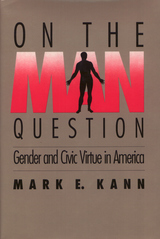
Focusing on Seventeenth-Century English political philosophy and Nineteenth-Century American culture, Mark Kann challenges the widely-held view that American political institutions are grounded in the primacy of individualism. Liberal thinkers have long been concerned that men are too passionate and selfish to exercise individual rights without causing social chaos. Kann demonstrates how a desperate search to answer the man question began to revolutionize gender relations He examines "the other liberal tradition in America" which downplays the value of individualism, elevates the ongoing significance of an "engendered civic virtue," and incorporates classical republicanism into the fabric of modern political discourse.
The author traces the cultural conditioning of the white middle class that produced the ideal of self-sacrificing wives whose lives were devoted to creating a haven for their husbands and a school of virtue for their sons. Upon leaving home, these young men were to be schooled in manliness in the military in order to be capable of assuming positions of power as they were vacated by their fathers’ generation. Thus, in the norms of fatherhood, fraternity, womanhood, and militarism, the male’s individualism was conditioned with a strong dose of civic virtue.

In Patriotic Education in a Global Age, philosopher Randall Curren and historian Charles Dorn address these questions as they seek to understand what role patriotism might legitimately play in schools as an aspect of civic education. They trace the aims and rationales that have guided the inculcation of patriotism in American schools over the years, the methods by which schools have sought to cultivate patriotism, and the conceptions of patriotism at work in those aims, rationales, and methods. They then examine what those conceptions mean for justice, education, and human flourishing. Though the history of attempts to cultivate patriotism in schools offers both positive and cautionary lessons, Curren and Dorn ultimately argue that a civic education organized around three components of civic virtue—intelligence, friendship, and competence—and an inclusive and enabling school community can contribute to the development of a virtuous form of patriotism that is compatible with equal citizenship, reasoned dissent, global justice, and devotion to the health of democratic institutions and the natural environment. Patriotic Education in a Global Age mounts a spirited defense of democratic institutions as it situates an understanding of patriotism in the context of nationalist, populist, and authoritarian movements in the United States and Europe, and will be of interest to anyone concerned about polarization in public life and the future of democracy.

Since 1783, patriotic societies have become an integral part of American history. The great number of Sons, Daughters, and Dames, and the alphabetical jungle of G.A.R., D.A.R., V.F.W., U.C.V., U.D.C., W.R.D., etc. are well known--and are often subjects of controversy. Wallace Evan Davies here recounts, in fascinating detail, the activities and attitudes of both veterans' and hereditary patriotic societies in America up to 1900. In a lively manner, he explores their significance as social organizations, their concept of patriotism, and their influence upon public opinion and legislation.
At the close of the American Revolution a group of officers formed the first patriotic veterans' society, The Society of the Cincinnati--open to all officers who had served for three years or were in the army at the end of the Revolution. Thus it began. Then, after the Civil War, came the numerous organizations of veterans of both sides and of their relatives. And as some Americans became more nationalistic, others, becoming absorbed in family trees, started the many hereditary societies. After discussing the founding of men's, women's, and children's patriotic societies, the author describes their organizational aspects: their size, qualifications for membership, officers, dues, ritual, badges, costumes, and the like. In hereditary groups, membership wasdeliberately limited, for exclusiveness was often their strongest appeal. The veterans' groups, however, were usually anxious to be as large as possible so as to enhance their influence upon legislators.
The appearance, beginning in the 1860's, of nearly seventy patriotic newspapers and magazines testifies to the rising popularity of these groups: prominent publications of the patriotic press included The Great Republic, The Soldiers' Friend, The Grand Army Record, The Vedette, National Tribune, and American Tribune. Many people turned to patriotism as to a sort of secular religion in which their increasing differences--in national origin and in religious and cultural inheritance--could be submerged; many others joined these societies primarily for social reasons. Once members, however, all became devoted campaigners for such projects as pensions for veterans, care of war orphans, and popular observance of national patriotic holidays; they also took to the field over desecrations of the flag, sectional animosity, the teaching of history, immigration policy, labor disturbances, military instruction in schools, and expansionism.
In Patriotism on Parade we have a cross-section of American social and intellectual history for the period 1783-1900. In writing it, Davies quotes liberally from contemporary letters and newspapers which make lively reading, and he has had access to the many scrapbooks and voluminous papers of William McDowell--prominent in the founding of several hereditary groups--which shed new light on the early years of the D.A.R. and the S.A.R. in particular. His book will be read with interest by the general public, by historians, and especially by persons who have belonged to any of the organizations he describes.

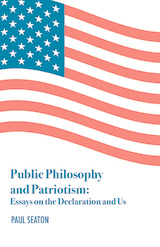
Paul Seaton’s Public Philosophy and Patriotism: The Declaration and Us is a very countercultural book. It advances the provocative thesis that not only is the Declaration worthy of our study today, but its principles and way of thinking about politics can and should be used to judge us and our politics today. That’s countercultural. While conservatives still have a warm place for the document in their hearts, one rarely hears them apply it to today’s debates. Progressives tend to take two contradictory tacks toward the founding document: on one hand, it’s the negligible product of hypocritical white males, on another, it limns the “ideals” and “values” of the American project that History is charged with fulfilling. Neither of these views takes the document intellectually seriously. Jefferson, however, articulated a different view when he called the Declaration “an expression of the American mind” at the time of the Revolution. Here was a self-conscious, self-confident American mind, ready to take on the world. Taking his cue from Jefferson, Seaton takes the Declaration seriously. He takes it seriously as the expression of a mind that confidently judged despotic designs, but also grasped the principles of free government and free and reasonable politics and looked forward to a country embodying them. Seaton argues that both these dimensions of Declaration political thought are applicable today.
He does so in an interesting way. For a number of years, he penned a Fourth of July essay on “the Declaration and Us” for the Law & Liberty website. On that occasion, he provided an exposition of some theme of the Declaration and applied it to a contemporary debate or issue. Over the years, they added up to a rather full exposition of the document, as well as an ongoing commentary on American political life. With this collection, the essentials of the Declaration’s view of politics are laid bare, and significant threats to freedom-loving Americans are identified. This is the bold claim and aim of this unique book.
At the beginning and end of the collection, Seaton makes a point of dating the completion of the manuscript on April 18th. When the curious reader looks up the date, he finds that it is the date when Paul Revere undertook his famous ride. In this way, the author indicates his judgment of the dire circumstances in which we live today and the patriotic models to which he hearkens. In the form of an explication de texte, this collection is a call to arms against today’s enemies of ordered liberty.

"In The Reconstruction of Patriotism, Morris Janowitz . . . places a national-service program on the national agenda. . . . Like William James, Janowitz envisions government enrolling young people to work for a year or two at subsistence pay, doing jobs that benefit society—working with, say, 'conservation, health, or old-age problems.' He believes that we need a service program because since the end of the Second World War our citizens (and, indeed, citizens of almost all the advanced industrial nations) have become more keenly aware of their rights than of their obligations, and generations are growing up with little or no understanding that they are members of a national community and have responsibilities to it—that they must give as well as take. . . . Because it reopens discussion of our wider obligations and how to fulfill them, Mr. Janowitz's thoughtful book is in itself a national service."—Naomi Bliven, The New Yorker
"Morris Janowitz examines an issue that seldom is subject to social and political analysis—patriotism. His thesis is clear: The long-term trend in politics has been to enhance citizen rights without effective articulation of citizen obligations. A meaningful balance between the two, he contends, must be restored. . . . The strength of this study lies in Janowitz's persuasive argument that the durability and vitality of democratic institutions require that a sense of community, or shared values, be preserved. Without civiz consciousness, he rightly observes, social and political fragmentation ensues. . . . A lucid and impressively researched polemic."—W. Wesley McDonald, American Political Science Review
"Janowitz addresses a seminal issue: how to restore the sense of shared civic responsibility that has fallen victim in recent years to our growing preoccupation with individual rights and the rise of special-interest groups. . . . Central to his prescription is the revival of the concept of the citizen soldier, whose importance since pre-Revolutionary War days Janoqitz discusses at length. He concludes, 'There can be no reconstruction of patriotism without a system of national service.' . . . An important book. I highly recommend it."—Washington Monthly
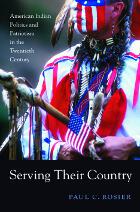
Over the twentieth century, American Indians fought for their right to be both American and Indian. In an illuminating book, Paul C. Rosier traces how Indians defined democracy, citizenship, and patriotism in both domestic and international contexts.
Battles over the place of Indians in the fabric of American life took place on reservations, in wartime service, in cold war rhetoric, and in the courtroom. The Society of American Indians, founded in 1911, asserted that America needed Indian cultural and spiritual values. In World War II, Indians fought for their ancestral homelands and for the United States. The domestic struggle of Indian nations to defend their cultures intersected with the international cold war stand against termination—the attempt by the federal government to end the reservation system. Native Americans seized on the ideals of freedom and self-determination to convince the government to preserve reservations as places of cultural strength. Red Power activists in the 1960s and 1970s drew on Third World independence movements to assert an ethnic nationalism that erupted in a series of protests—in Iroquois country, in the Pacific Northwest, during the occupation of Alcatraz Island, and at Wounded Knee.
Believing in an empire of liberty for all, Native Americans pressed the United States to honor its obligations at home and abroad. Like African Americans, twentieth-century Native Americans served as a visible symbol of an America searching for rights and justice. American history is incomplete without their story.
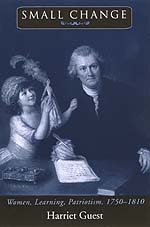
women and the nature of domesticity were the focus of widespread debate in Britain. The emergence of an identifiably feminist voice in that debate is the subject of Harriet Guest's new study, which explores how small changes in the meaning of patriotism and the relations between public and private categories permitted educated British women to imagine themselves as political subjects.
Small Change considers the celebration of learned women as tokens of national progress in the context of a commercial culture that complicates notions of gender difference. Guest offers a fascinating account of the women of the bluestocking circle, focusing in particular on Elizabeth Carter, hailed as the paradigmatic learned and domestic woman. She discusses the importance of the American war to the changing relation between patriotism and gender in the 1770s and 1780s, and she casts new light on Mary Wollstonecraft's writing of the 1790s, considering it in relation to the anti-feminine discourse of Hannah More, and the utopian feminism of Mary Hays.
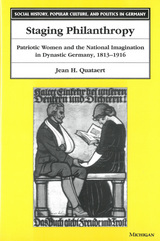
An original and truly multi-disciplinary work, Staging Philanthropy uses archival research to reconstruct the neglected history of women's philanthropic organizations during the 'long' nineteenth century. Borrowing from cultural anthropologists, Jean Quataert explores how meaning is created in the theater of politics. Linking gender with nationalism and war with humanitarianism, Quataert weaves her analysis together with themes of German historiography and the wider context of European history.
Staging Philanthropy will interest readers in German history, women's history, politics and anthropology, as well as those whose interest is in medicalization and the German Red Cross. This book situates itself in the middle of a string of debates pertaining to modern German history and, thus, should also appeal to readers from the general educated public.
Jean Quataert is Professor of History and Women's Studies, Binghamton University. She has previously published a number of books, including Connecting Spheres: European Women in a Globalizing World, 1500 to the Present with Marilyn J. Boxer (Oxford, 1999).
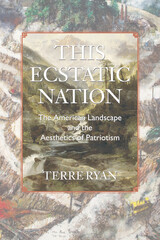
Terre Ryan examines this phenomenon by exploring the overlapping trails of national mythology, landscape aesthetics, patriotic discourse, and public policy. Tracing her journeys around bombing grounds in Nevada, logging sites in Oregon, and energy fields in Wyoming, she argues that business and government agencies often frame commercial projects and national myths according to nineteenth-century beliefs about landscape and bounty. Advertisements and political promotional materials following this aesthetic framework perpetuate frontier-era ideas about the environment as commodity, scenery, and cultural trashlands. Transmitted through all types of media, nineteenth-century perspectives on landscape continue to inform mainstream perceptions of the environment, environmental policies, and representations of American patriotism.
Combining personal narrative with factual reportage, political and cultural critique, and historical analysis, Ryan reframes the images we see every day and places them into a larger national narrative.
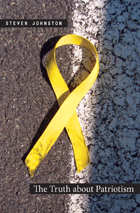
Drawing largely from aspects of American political and popular culture, this wide-ranging book presents a wealth of examples to disclose patriotism’s self-defeating character. They include Richard Rorty’s and John Schaar’s enmity-driven love of country, Socrates’s angry judicial suicide, the violent obsessions of High Noon and Saving Private Ryan, the triumphalist self-display of the World War II Memorial, Oliver Stone’s and Don DeLillo’s spectacular representations of the assassination of President Kennedy, George W. Bush’s symbolic sacrifice of more Americans in commemoration of September 2001, and yet other memorials to and apologies for patriotism. Ultimately, Johnston calls for a vision of democracy that uses the tragic possibilities inherent in politics as a spur to a life-affirming civic ethos of reciprocal generosity.
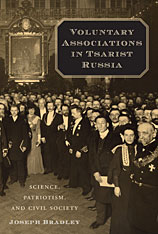
On the eve of World War I, Russia, not known as a nation of joiners, had thousands of voluntary associations. Joseph Bradley examines the crucial role of voluntary associations in the development of civil society in Russia from the late eighteenth to the early twentieth century.
Russians populated a growing public sphere with societies based on the model of the European enlightenment. Owing to the mission of such learned associations as the Free Economic Society, the Moscow Agricultural Society, and the Russian Geographical Society, civil society became inextricably linked to patriotism and the dissemination of scientific knowledge. Although civil society and the autocratic state are often described as bitter rivals, cooperation in the project of national prestige and prosperity was more often the rule. However, an increasing public assertiveness challenged autocratic authority, and associations became a focal point of a contradictory political culture: they fostered a state-society partnership but at the same time were a critical element in the effort to emancipate society from autocracy and arbitrary officialdom.
READERS
Browse our collection.
PUBLISHERS
See BiblioVault's publisher services.
STUDENT SERVICES
Files for college accessibility offices.
UChicago Accessibility Resources
home | accessibility | search | about | contact us
BiblioVault ® 2001 - 2024
The University of Chicago Press









